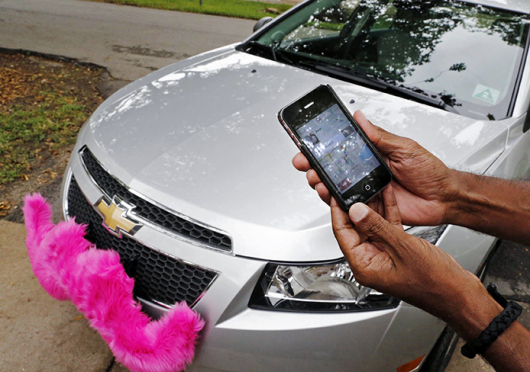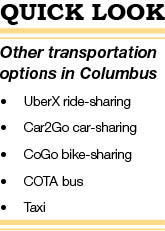
The Lyft app allows users to request a ride in Miami on June 4, 2014. Regulators across the U.S. and in Europe are struggling with how to control the digital-dispatch services that have upended the transportation business. Credit: Courtesy of TNS
Students who use Lyft to get around town might have to trade the car with a pink mustache for a yellow taxi cab when the app-based ride-sharing service officially suspends operations in Columbus on Monday.
Lyft, a San Francisco-based company that uses a smartphone app to connect riders and drivers, announced in a January email to Columbus drivers that it would be pausing operations in Ohio’s capital city.
The suspension of operations in Columbus is set to begin at noon on Monday, the email said.
Mary Caroline Pruitt, a Lyft spokeswoman, said the decision was based on “unnecessarily burdensome regulations” enacted by the city of Columbus that “essentially treat Lyft the same as a taxi.”
“We are now forced to choose between endorsing rules that will make it exceedingly difficult for Lyft’s peer-to-peer model to thrive, or taking a stand for the right long-term path forward,” Pruitt said in an email.
Lyft, which launched in Columbus in February 2014, is a peer-to-peer transport network company that hires drivers to use their personal vehicles to transport customers throughout the city, Pruitt said.
Customers are able to request a Lyft vehicle for up to six passengers by inputting their location into the company’s app. A driver will then come pick up the customer in a car — often featuring the company’s signature fuzzy pink mustache grille ornament — and drive him or her to the desired destination.
Instead of an in-car meter, Lyft customers pay for the ride using the credit card they have registered through the app.
In March 2014, the Columbus City Council made changes to the Business Regulation and Licensing Code, Title 5, to include peer-to-peer transportation networks like Lyft, Uber and Sidecar in its existing vehicle for hire code.
Additions to the code included requiring companies like Lyft to conduct background checks on its drivers and subject the vehicles to mechanical inspection. The code also was revised to require Lyft and similar companies to obtain a “Vehicle for Hire” owner’s license, and drivers are now required to possess a “Vehicle for Hire” driver’s license, issued by the Director of Public Safety.
According to requirements listed on the company’s website, Lyft drivers are screened for criminal offenses and driving accidents, and the vehicles used must pass an inspection before they can be driven for the service.
Columbus Department of Public Safety spokeswoman Amanda Ford said the city was “surprised and disappointed” to hear that Lyft had decided to suspend operations, as more than 900 ridesharing drivers had gone through the licensing process since the revised legislation was passed.
“Some drivers have reached out (after hearing of Lyft’s decision to suspend operations) and asked what has changed, and I told them that nothing has changed from the legislation,” Ford said.
Pruitt said although she could not provide specific numbers regarding the number of Lyft drivers or customers in the Columbus area, there are “tens of thousands” of drivers currently registered on the Lyft platform nationwide, and the company has given more than 10 million rides.
Tyler Holland, a second-year in marketing, said he uses Lyft as an alternative means of transportation throughout the city because he thinks it is a “friendlier” experience.
“I have taken taxis in Columbus before and sometimes they are not clean and uncomfortable,” Holland said. “I feel like (Lyft) is more of a personal thing, like getting in a car with a friend, instead of calling a taxi … It is more convenient, especially for college students because most of us have smartphones … it is more about breaking down those social barriers.”
Holland, a regular Lyft user, said he understands why Lyft decided to leave in the face of increased regulations in Columbus because he thinks the new requirements complicate the process for drivers, many of whom work for the company in their free time.
“(The drivers) may be people who work or go to school here and just do Lyft and Uber on the side,” he said. “They are not professional drivers, it is not their career. They might pick up a couple of hours as a side job.”
Holland said he is sad to see Lyft go, and said he will be using UberX, another peer-to-peer transport company, in the meantime, but hopes Lyft returns to Columbus someday.
“I see where (Lyft) is coming from, but I’d like to see them come back,” he said.
Ford said the Department of Public Safety understands Lyft’s concerns regarding the regulation of drivers, but upholds that safety comes first.
“Ensuring safety (is the main priority). I need to know you feel comfortable when you get into the vehicle,” she said. “Ride sharing has been good for Columbus, and I know (they) are used a lot by college students … but from the city’s perspective, we (regulate) so people are safe.”
Currently, Lyft does not have any plans to return to Columbus, but the company is operating in other Ohio cities, including Cleveland, Cincinnati and Toledo, Pruitt said.



